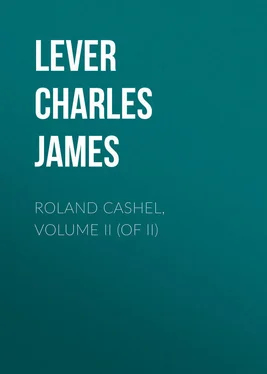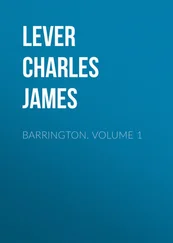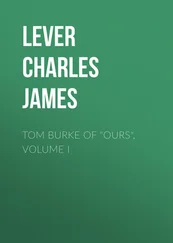Charles Lever - Roland Cashel, Volume II (of II)
Здесь есть возможность читать онлайн «Charles Lever - Roland Cashel, Volume II (of II)» — ознакомительный отрывок электронной книги совершенно бесплатно, а после прочтения отрывка купить полную версию. В некоторых случаях можно слушать аудио, скачать через торрент в формате fb2 и присутствует краткое содержание. Жанр: literature_19, foreign_antique, foreign_prose, на английском языке. Описание произведения, (предисловие) а так же отзывы посетителей доступны на портале библиотеки ЛибКат.
- Название:Roland Cashel, Volume II (of II)
- Автор:
- Жанр:
- Год:неизвестен
- ISBN:нет данных
- Рейтинг книги:5 / 5. Голосов: 1
-
Избранное:Добавить в избранное
- Отзывы:
-
Ваша оценка:
- 100
- 1
- 2
- 3
- 4
- 5
Roland Cashel, Volume II (of II): краткое содержание, описание и аннотация
Предлагаем к чтению аннотацию, описание, краткое содержание или предисловие (зависит от того, что написал сам автор книги «Roland Cashel, Volume II (of II)»). Если вы не нашли необходимую информацию о книге — напишите в комментариях, мы постараемся отыскать её.
Roland Cashel, Volume II (of II) — читать онлайн ознакомительный отрывок
Ниже представлен текст книги, разбитый по страницам. Система сохранения места последней прочитанной страницы, позволяет с удобством читать онлайн бесплатно книгу «Roland Cashel, Volume II (of II)», без необходимости каждый раз заново искать на чём Вы остановились. Поставьте закладку, и сможете в любой момент перейти на страницу, на которой закончили чтение.
Интервал:
Закладка:
It was without one particle of vulgar pride of wealth that he delighted in the pleasure he saw around him; it was the mere buoyancy of a high-spirited nature. The cost no more entered into his calculations in a personal than a pecuniary sense. A consciousness that he was the source of all that splendid festivity, – that his will was the motive-power of all that complex machinery of pleasure, – increased, but did not constitute, his enjoyment. To see his guests happy, in the various modes they preferred, was his great delight, and, for once, he felt inclined to think that wealth had great privileges.
The display of all which gratified him most was that which usually took place each day after luncheon; when the great space before the house was thronged with equipages of various kinds and degrees, with saddle-horses and mounted grooms, and amid all the bustle of discussing where to, and with whom, the party issued forth to spend the hours before dinner.
A looker-on would have been amused to watch all the little devices in request, to join this party, to avoid that, to secure a seat in a certain carriage, or to escape from some other; Linton’s chief amusement being to thwart as many of these plans as he could, and while he packed a sleepy Chief Justice into the same barouche with the gay Kennyfeck girls, to commit Lady Janet to the care of some dashing dragoon, who did not dare decline the wife of a “Commander of the Forces.”
Cashel always joined the party on horseback, so long as Lady Kilgoff kept the house, which she did for the first week of her stay; but when she announced her intention of driving out, he offered his services to accompany her. By the merest accident it chanced that the very day she fixed on for her first excursion was that on which Cashel had determined to try a new and most splendid equipage which had just arrived; it was a phaeton, built in all the costly splendor of the “Regency of the Duke of Orleans,” – one of those gorgeous toys which even a voluptuous age gazed at with wonder. Two jet-black Arabians, of perfect symmetry, drew it, the whole forming a most beautiful equipage.
Exclamations of astonishment and admiration broke from the whole party as the carriage drove up to the door, where all were now standing.
“Whose can it be? Where did it come from? What a magnificent phaeton! Mr. Cashel, pray tell us all about it. Do, Mr. Linton, give us its history.”
“It has none as yet, my dear Mrs. White; that it may have, one of these days, is quite possible.”
Lady Janet heard the speech, and nodded significantly in assent.
“Mr. Linton, you are coming with us, a’n’t you?” said a lady’s voice from a britzska close by.
“I really don’t know how the arrangement is; Cashel said something about my driving Lady Kilgoff.”
Lady Kilgoff pressed her lips close, and gathered her mantle together as if by some sudden impulse of temper, but never spoke a word. At the same instant Cashel made his appearance from the house.
“Are you to drive me, Mr. Cashel?” said she, calmly.
“If you will honor me so far,” replied he, bowing.
“I fancied you said something to me about being her Ladyship’s charioteer,” said Linton.
“You must have been dreaming, man,” cried Cashel, laughing.
“Will you allow my Lady to choose?” rejoined Linton, jokingly, while he stole at her a look of insolent malice.
Cashel stood uncertain what to say or do in the emergency, when, with a firm and determined voice, Lady Kilgoff said, —
“I must own I have no confidence in Mr. Linton’s guidance.”
“There, Tom,” said Cashel, gayly, “I ‘m glad your vanity came in for that.”
“I have only to hope that you are in safer conduct, my Lady,” said Linton; and he bowed with uncovered head, and then stood gazing after the swift carriage as it hastened down the avenue.
“Is it all true about these Kennyfeck girls having so much tin’?” said Captain Jennings, as he stroked down his moustache complacently.
“They say five-and-twenty thousand each,” said Linton, “and I rather credit the rumor.”
“Eh, aw! one might do worse,” yawned the hussar, languidly; “I wish they hadn’t that confounded accent!” And so he moved off to join the party on horseback.
“You are coming with me, Jemima,” said Mr. Downie Meek to his daughter. “I want to pay a visit to those works at Killaloe, we have so much committee talk in the House on inland navigation. Oh, dear! it is very tiresome.”
“Charley says I ‘m to go with him, pa; he ‘s about to try Smasher as a leader, and wants me, if anything goes wrong.”
“Oh, dear! quite impossible.”
“Yes, yes, Jim, I insist,” said Frobisher, in a half-whisper; “never mind the governor.”
“Here comes the drag, pa. Oh, how beautiful it looks! There they go, all together; and Smasher, how neatly he carries himself! I say, Charley, he has no fancy for that splinter-bar so near him, – it touches his near hock every instant; would n’t it be better to let his trace a hole looser?”
“So it would,” said Frobisher; “but get up and hold the ribbons till I have got my gloves on. I say, Linton, keep Downie in chat one moment, until we ‘re off.”
This kindly office was, however, anticipated by Lady Janet MacFarline, who, in her brief transit from the door to the carriage, always contrived to drop each of the twenty things she loaded herself with at starting, and thus to press into the service as many of the bystanders as possible, who followed, one with a muff, another with a smelling-bottle, a third with a book, a fourth with her knitting, and so on; while Flint brought up the rear with more air-cushions and hot-water apparatus than ever were seen before for the accommodation of two persons. In fact, if the atmosphere of our dear island, instead of being the mere innocent thing of fog it is, had been surcharged with all the pestilential vapors of the mistral and the typhoon together, she could not have armed herself with stronger precautions against it; while even Sir Andrew, with the constitution of a Russian bear, was compelled to wear blue spectacles in sunshine, and a respirator when it lowered, – leaving him, as he said, to the “domnable alternative o’ being blind or dumb.”
“I maun say,” muttered he, behind his barrier of mouth plate, “that Mesther Cashel has his ain notions aboot amusin’ his company when he leaves ane o’ his guests to drive aboot wi’ his ain wife. Ech, sir, it is a pleasure I need na hae come so far to enjoy.”
“Where’s Sir Harvey Upton, Sir Andrew?” said my Lady, tartly; “he has never been near me to-day. I hope he ‘s not making a fool of himself with those Kennyfeck minxes.”
“I dinna ken, and I dinna care,” growled Sir Andrew; and then to himself, he added, “An’ if he be, it’s aye better fooling wi’ young lassies than doited auld women!”
“A place for you, Mr. Linton!” said Mrs. White, as she seated herself in a low drosky, where her companion, Mr. Howie, sat, surrounded with all the details for a sketching-excursion.
“Thanks, but I have nothing so agreeable in prospect.”
“Why, what are you about to do?”
“Alas! I must set out on a canvassing expedition, to court the sweet voices of my interesting constituency. You know that I am a candidate for the borough.”
“That must be very disagreeable.”
“It is, but I could not get off; Cashel is incurably lazy, and I never know how to say ‘no.’”
“Well, good-bye, and all fortune to you,” said she; and they drove away.
Mr. Kennyfeck and the Chief Justice, mounted on what are called sure-footed ponies, and a few others, still lingered about the door, but Linton took no notice of them, but at once re-entered the house.
Читать дальшеИнтервал:
Закладка:
Похожие книги на «Roland Cashel, Volume II (of II)»
Представляем Вашему вниманию похожие книги на «Roland Cashel, Volume II (of II)» списком для выбора. Мы отобрали схожую по названию и смыслу литературу в надежде предоставить читателям больше вариантов отыскать новые, интересные, ещё непрочитанные произведения.
Обсуждение, отзывы о книге «Roland Cashel, Volume II (of II)» и просто собственные мнения читателей. Оставьте ваши комментарии, напишите, что Вы думаете о произведении, его смысле или главных героях. Укажите что конкретно понравилось, а что нет, и почему Вы так считаете.












